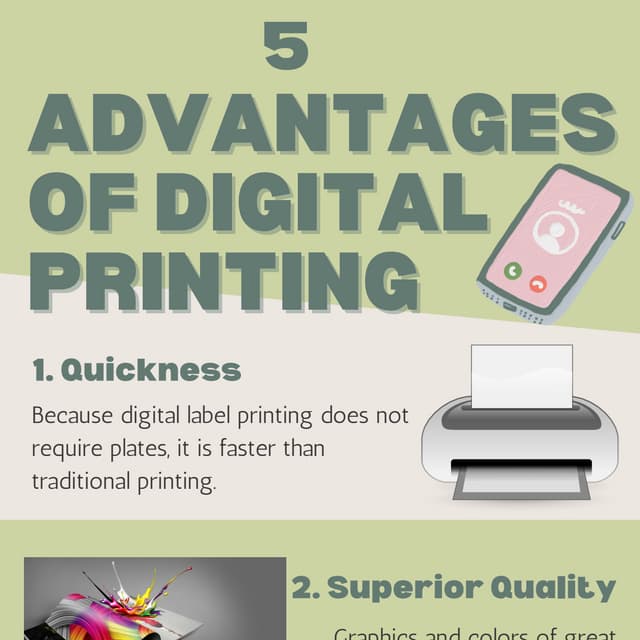Getting My Digital Printing To Work
Getting My Digital Printing To Work
Blog Article
The Ultimate Guide To Digital Printing
Table of ContentsWhat Does Digital Printing Mean?Not known Facts About Digital PrintingSome Known Questions About Digital Printing.4 Simple Techniques For Digital PrintingDigital Printing - TruthsDigital Printing Can Be Fun For Everyone
Variable information printing, such as direct mail with personalized codes and addresses, is ideally fit for digital printing. Digital quick printing only needs four actions of design, evaluation, printing and binding to obtain everything done. Digital fast printing has an unmatched benefit: print on demand.According to PMMI, electronic printing allows brands and manufacturers to react promptly to consumer demands while enhancing the supply chain, lowering warehousing price and waste, and enjoying faster time to market. That all audios terrific, however how does this innovation do all that? The major differentiator of these modern technologies is that there are no set up costs and no plates with electronic printing.
Things about Digital Printing
According to Wikipedia, the best distinction between digital printing and traditional approaches such as lithography, flexography, gravure, or letterpress - Digital Printing is that there is no requirement to replace printing plates in electronic printing, whereas in these analog printing approaches home plates are repetitively changed. This leads to quicker turn-around time and reduces expense when using electronic printing.
Digital printing is very flexible, so it's easy to make modifications to the bundle design rapidly. It all goes back to the plates.
Much more supply can indicate more waste later on. With traditional printing approaches, short-run printing is just not possible. Because a great style can make or damage your item, electronic printing continually creates premium, clear and vibrant graphics each time. Digital printing on adaptable bags includes the intense, dynamic, and precise graphics that almost beckon consumers to connect and touch them.
Digital printing is the process of printing digital-based pictures directly onto a variety of media substrates. There is no requirement for a printing plate, unlike with balanced out printing. Digital data such as PDFs or desktop posting data can be sent out straight to the digital printing machine to publish theoretically, image paper, canvas, fabric, synthetics, cardstock and other substrates.
Digital Printing - Truths
According to PMMI, electronic printing allows brands and producers to respond swiftly to client demands while improving the supply chain, lowering warehousing price and waste, and delighting in faster time to market. That all audios fantastic, but just how does this modern technology do all that? The significant differentiator of these modern technologies is that there are no set up costs and no plates with electronic printing.
According to Wikipedia, the biggest difference in between electronic printing and standard approaches such as lithography, flexography, gravure, or letterpress is that there is no requirement to replace printing plates in electronic printing, whereas in these analog printing techniques home plates are repeatedly changed. This results in quicker turnaround time and reduces cost when making use of digital printing.

Little Known Facts About Digital Printing.
More supply can indicate even more waste down the roadway. With traditional printing techniques, short-run printing is just not feasible. Because a terrific layout can make or damage your item, digital printing consistently develops high-grade, clear and vivid graphics each time. Digital printing on versatile pouches includes the bright, vibrant, and specific graphics that almost beckon customers to connect and touch them.

According to PMMI, digital printing allows brands and makers to respond quickly to consumer needs while enhancing the supply chain, decreasing warehousing expense and waste, and taking pleasure in faster time to market. That all audios excellent, however exactly how does this modern technology do all that? The major differentiator of these technologies is that there are no set-up charges and no plates with digital printing.
Top Guidelines Of Digital Printing
According to Wikipedia, the best distinction in between digital printing and traditional approaches such as lithography, flexography, gravure, or letterpress is that there is no demand to replace printing plates in electronic printing, whereas in these analog printing techniques home plates are consistently replaced. This causes quicker turnaround time and lowers price when using electronic printing.
Digital printing is very adaptable, so it's easy to make adjustments to the plan design swiftly. It all goes back to the plates.

The 10-Second Trick For Digital Printing
Digital printing is the procedure of printing digital-based photos directly onto a range of media substratums. There is no requirement for a printing plate, unlike with balanced out printing. Digital documents such as PDFs or desktop computer posting data can be sent directly to the digital printing press to print theoretically, image paper, canvas, textile, synthetics, cardstock and other substrates.
Report this page